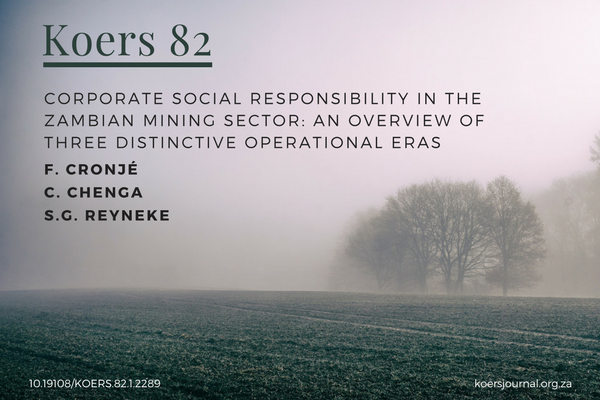Abstract
ABSTRACT
Corporate Social Responsibility (CSR) within the extractive industry is a relevant and contentious issue globally. Issues pertaining to equality, human rights and sustainable development are pervasive throughout the economic, social and environmental arenas of the extractive industry. There is still not consensus on the definition of CSR regarding the measurement of performance or impact, or how to determine which of the various ‘developmental’ components of the concept – namely economic, social or environment – takes precedent over the other where there are competing interests.
This article on CSR in the Zambian Copperbelt uses the experiences of mining communities as stakeholders who have gone through three types and eras of CSR practices within a generation. The Zambian Copperbelt has a history of operating under colonial rule, nationalisation and privatisation. The aim is to interrogate the CSR practices of the three identified eras in the history of the Zambian Copperbelt.
The article is based on the findings from a mainly qualitative research approach. The research employed the survey procedure through focus groups, personal interviews and inputs from key informants.
The findings are presented by a selection of narratives of CSR experiences from the Zambian Copperbelt mining communities. Consequently, an in depth discussion and analysis reflecting the effects of a CSR enabling environment in the three eras as experienced by community members follows. The paper concludes with a brief overview of the lessons learnt throughout the three eras.
OPSOMMING
Korporatiewe Sosiale Verantwoordelikheid (KSV) binne die ontginningsindustrie is 'n relevante en omstrede kwessie wêreldwyd. Kwessies met betrekking tot gelykheid, menseregte en volhoubare ontwikkeling is universeel ooglopend binne die ekonomiese-, sosiale- en omgewingsarenas van die mynsektor. Daar is steeds nie konsensus oor die definisie van KSV rakende die meting van prestasie of impak daarvan nie, ook nie hoe om te bepaal watter een van die verskillende "ontwikkelings" komponente van die konsep (naamlik die ekonomiese, sosiale of omgewingsaspek) bevoordeel moet word bo die ander, waar daar mededingende belange is nie.
Hierdie artikel oor KSV in die Zambiese Koperstreek gebruik die ervarings van myngemeenskappe as belanghebbendes wat deur drie tipes en tydperke van KSV praktyke gegaan het, binne 'n generasie. Die Zambiese Koperstreek het 'n geskiedenis van die bedrywighede onder koloniale heerskappy, nasionalisering en privatisering. Die doel is om die KSV praktyke van die drie bogenoemde eras te ondersoek deur die geskiedenis van die Zambiese Koperstreek.
Hierdie artikel is gebaseer op die bevindinge van 'n hoofsaaklik kwalitatiewe navorsingsbenadering en het gebruik gemaak van fokusgroepe, persoonlike onderhoude en insette deur sleutel informante.
Die bevindinge word aangebied deur 'n seleksie van verhale rakende die KSV ervarings van die Zambiese Koperstreek myngemeenskappe. Daarna volg ?n in-diepte bespreking en ontleding rakende die gevolge van 'n KSV bemagtigende omgewing, in die drie eras soos ervaar deur lede van die gemeenskap. Die artikel sluit af met 'n kort oorsig oor die lesse wat geleer is oor die drie eras.

This work is licensed under a Creative Commons Attribution-NoDerivatives 4.0 International License.
Copyright (c) 2017 Freek Cronje, Suzanne Reyneke, Charity Chenga


_31.png) https://doi.org/10.19108/KOERS.82.1.2286
https://doi.org/10.19108/KOERS.82.1.2286